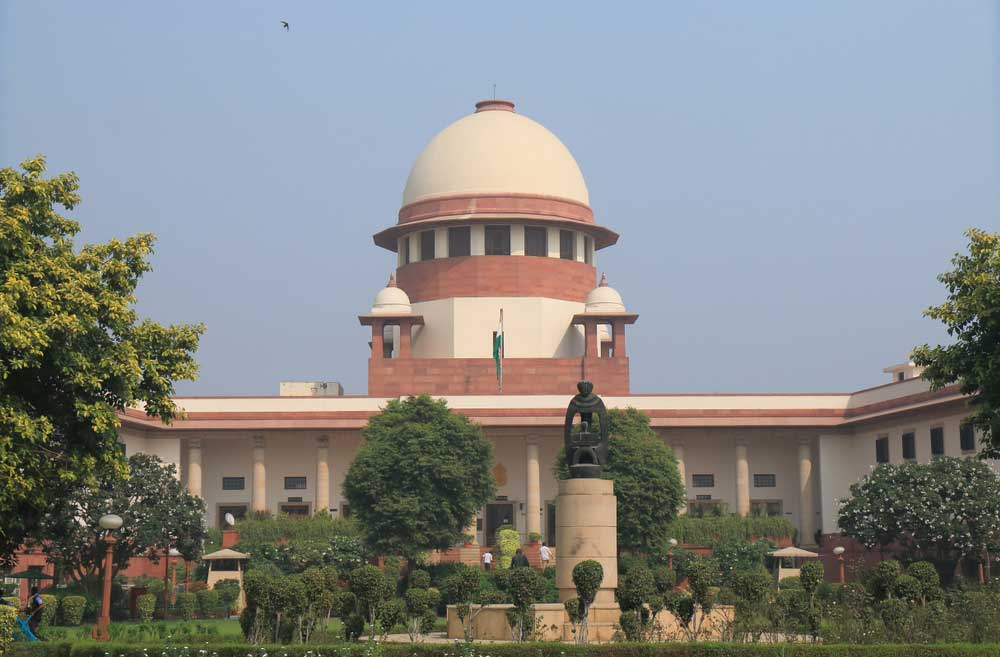Rajiv Dhavan, the lawyer for the Muslim parties in the Ayodhya land suit, has reportedly told the Supreme Court bench hearing the case he had noticed that the judges' 'questions have been directed at me', not the Hindu parties.
Dhavan's comment was flagged on the Twitter handle of Bar & Bench, a legal information website that is following the day-to-day proceedings in the Ayodhya land case.
The tweet attributed to Dhavan by the Bar and Bench handle said: '#RamMandir - #BabriMasjid: One thing I have noticed about this hearing is that all Your Lordships questions have been directed at me. No questions have been put to them (Hindus), Rajeev Dhavan.'
The thread put out by Bar & Bench is below:
The comment by Dhavan comes a day after Section 144 was clamped in Ayodhya from October 12 to December 10.
The hearing in the politically sensitive case entered its final leg on Monday after the weeklong Dussehra break. The five-judge Constitution bench, headed by Chief Justice Ranjan Gogoi, which started the day-to-day proceedings on August 6 after a mediation process failed to find a solution, has fixed October 17 as the date to end the hearing. The other judges on the bench are Justices S.A. Bobde, D.Y. Chandrachud, Ashok Bhushan and S.A. Nazeer.
The judgment is expected to be pronounced by November 17, when Chief Justice Gogoi retires. November 17 is within the two-month window when Section 144 will be operational in Ayodhya.
The Ayodhya district magistrate's notice yesterday on the clamping of restrictions made it clear that the administration expected a verdict in the case in the 'near future'. The notice barred operation of unmanned aerial vehicles for surveys, put restrictions on boating and firecracker sales and Diwali celebrations in the town.
On October 12, the VHP said that seers would light 5,100 earthen lamps at the disputed Ram Janambhoomi-Babri Masjid site on Diwali but the district administration asserted no religious activity beyond the Supreme Court's mandate would be allowed.
Faizabad divisional commissioner Manoj Mishra, who is in charge of the disputed land by the Supreme Court, said: 'Any type of new tradition will not be allowed at the disputed site. Only those religious activities will be allowed which are permitted by the apex court.'
According to the apex court's order of January 7, 1993, any type of religious activity is prohibited inside the disputed site except the chief priest performing only routine prayers of the deity including offering food.
On December 6 ,1992, the Babri Masjid in Ayodhya was demolished by kar sevaks affiliated to various Hindutva outfits. The demolition sparked riots in several parts of India. It is seen as the key trigger behind the Bombay serial blasts on March 12, 1993, that killed hundreds.
Fourteen appeals were filed in the apex court against the 2010 Allahabad High Court judgment that has said the 2.77-acre land in Ayodhya be divided equally among three parties -- the Sunni Waqf Board, the Nirmohi Akhara and the deity Ram Lalla.
Initially, five law suits were filed in the lower court. The first one was filed by Gopal Singh Visharad, a devotee of Ram Lalla, in 1950 to seek enforcement of the right of Hindus to worship at the disputed site.
The same year, the Paramahansa Ramachandra Das also filed a lawsuit for continuation of worship and keeping the idols under the central dome of the now-demolished disputed structure.
The plea was later withdrawn.
Later, the Nirmohi Akahara moved the trial court in 1959 seeking management and shebaiti (devotee) rights over the 2.77-acre land.
Then came the lawsuit of the Uttar Pradesh Sunni Central Wakf Board which moved the court in 1961, claiming title right over the property.
The deity, Ram Lalla Virajman, through next friend and former Allahabad High Court judge Deoki Nandan Agrawal, and the Janambhoomi (the birthplace) moved the lawsuit in 1989, seeking the title right over the entire disputed property on the key ground that the land itself has the character of the deity and of a juristic entity.
Later, all the lawsuits were transferred to Allahabad High Court for adjudication following the demolition of the Babri masjid on December 6, 1992.
Fixing the schedule for the final leg of the arguments, the bench had said that the Muslim side would complete the arguments on October 14 and then two days would be granted to the Hindu parties to sum up their rejoinders by October 16.
October 17 would be the day for wrapping up the hearing when all the parties would make the final arguments about the relief they are seeking, the court had said. The bench had earlier fixed October 18 as the deadline to conclude the hearing.
Written with inputs from PTI










